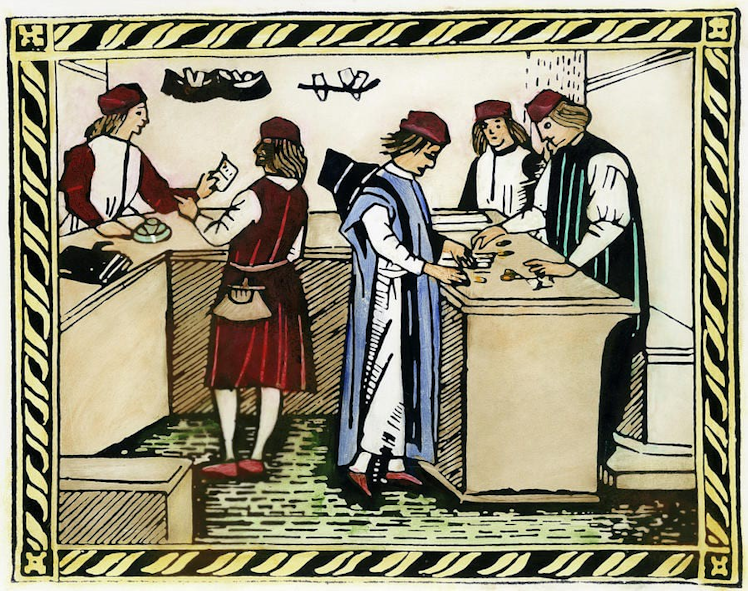Trending Assets
Top investors this month
Trending Assets
Top investors this month
The accountant shortage is a big deal
An underrated ingredient of economic growth and innovation is accounting. Not many people think about that when analyzing periods of economic growth and innovation.
During the 16th and 17th centuries, every social class of Dutch society practiced accounting. And it wasn't just merchants that practiced accounting; prostitutes in Holland also practiced accounting, particularly double-entry bookkeeping.
And what do many know about the Dutch during this period of time? They built one of the largest businesses in the world: the Dutch East India Company. And others know that the Dutch created the first-ever stock exchange during this period of time too. Compared to other empires, the Dutch empire was the richest during that time.

The Reformation movement in Europe wouldn't have happened if it weren't for accountants. Schools have taught us that Martin Luther fueled the Reformation movement, except he only provided the spark with his words. Accountants were the ones that fueled the movement as they were both engaging in the corruption of the Church as well as holding evidence of the Church's corrupt practices.
During the Renaissance, thousands of students in Florence would learn accounting and bankers like the Medici family saw their wealth surge as they maintained perfect accounting records.

It's the public confidence in the financial information of businesses that led to the rise of the Dutch East India Company, the creation of the first ever stock market, the success of Martin Luther's movement, and why the Medici family became one of the wealthiest people of the Renaissance time.
The pattern in history goes: good accounting creates good times and bad accounting leads to bad times.
So far, all I've talked about are how good accounting practices led to greater times throughout Europe before the Industrial Age. Before the Industrial Age, bad accounting practices did lead to bad times in Europe. Spain in the 15th century went bankrupt because bad accounting practices influenced bad decisions. France saw its monarchy rule be officially gone as King Louis XIV stopped recording his transactions in his accounting book after his finance minister, Jean-Baptiste Colbert, died.

And in modern times, some of the biggest shocks in financial markets and the economy were caused by bad accounting practices. Lehman Brothers and Enron are major examples of this.
The accounting shortage is something that investors should be worried about. According to Bloomberg Tax, the number of employed accountants and auditors fell by 17% between 2019 and 2021. Meanwhile, demand for accountants has surged as more companies went public, regulators are now looking to track carbon emissions, etc.
Looking at university enrollment numbers in accounting courses, from 2016 to 2019, there was a 4% decline in the number of students taking accounting courses. Meanwhile, the number of CPA candidates decreased by 7% between 2017 and 2018. In that same time, the number of candidates who passed the CPA exam fell by 6%. From the supply side, it's looking like universities are churning out fewer accountants annually.
Furthermore, employee turnover at accounting firms has been high. Low morale as well as many employees choosing to retire early are reasons for this high turnover. Other reasons are that many accounting employees are choosing to use their experiences in accounting firms to land better jobs that happen to be unrelated to accounting. For example, people attend an MBA program after a few years in Big 4 accounting and then use their time at the MBA program to transition into private equity, investment banking, management consulting, etc. Those careers come with better pay and more prestige.
Accountants do get paid well and that too has helped many retire earlier than expected.

As accounting becomes more sophisticated, some accountants in firms use their cleverness to improve their firm's financials. And that in of itself increases the need for more accountants. An accounting professor once told me that it takes two accountants to figure out how one accountant hid the ugly details of the business. Maybe we need more than two accountants investigating the possible fraud that one accountant has committed.
Higher demand for accountants and lower supply of accountants has created a labor shortage in America. It's amazing that people take comfort with investing in American companies as the "entire financial system thus increasingly rests on the shoulders of overworked and frazzled twenty-something Atlases."
Some will say that accounting's public image is a reason why the number of people pursuing the accounting career isn't growing. Another is that there are other business-like careers that pay similar, if not more for work that is cooler and that in some ways provides a bigger impact on the world.

"The obvious result of the talent shortage is an erosion in the quality of audits. Public companies are finding it harder to get accountants to audit their books and, when they do find them, must often work them harder. Important checks are skipped, and errors (or dodges) go unnoticed. If companies are late filing, then they risk running afoul of the SEC; if they include errors, then they risk fines and adverse market reaction. Even small errors can lead to a plunge in stock prices."
But at the same time:
"The chances that US regulators will catch errors, or worse, are arguably also being reduced by the shortage of accountants: The SEC faces an attrition rate of more than 6%, with a growing proportion of the work done by temps. Poorer oversight increases the likelihood of another Enron out there: a big company that is playing fast and loose with its finances and will eventually collapse, bringing economic havoc in its wake."
In a way, the accounting shortage has created an environment of blissful ignorance. Also, it has allowed the economy to be riddled with financial landmines. You never know if you're about to step on a financial landmine or not. Since short sellers seem to catch frauds before regulators, I hope that the stocks you hold won't be targeted by short sellers. And I hope that the management teams of the stocks you own are doing their part in providing accurate financial information to the public. If they're doing that already, then there's no need to fear the short sellers.

I understand that with the economy transitioning from physical goods to digital goods, measuring the intangibles can be difficult. And without an adequate number of accountants, that task becomes even harder to manage.
And like any problem, we'd like to think that technology will save the day. Unfortunately, the innovation with the accounting field is less than ideal. $INTU might be making it easier for people to manage the books of their business and Trullion is making machine learning tools to help accountants with tasks that relate to sampling, and $BL has been helping businesses automate accounting processes, but that isn't enough. The Big 4 accounting firms can't even create tools fast enough for their auditors and tax accountants because they themselves have been struggling to attract tech talent. Without adequate tech talent, they can't make the tools that their auditors and tax accountants need.

I hope that this accounting shortage doesn't give American businesses the reputation that Chinese businesses have built for themselves after the Great Recession: businesses with unreliable financial statements and highly prone to fraud. The trust in the financials that businesses provide to the public is how they're able to attract capital and make better decisions. If fraud flourishes, the economy becomes less productive as capital flows more into places that are less productive and areas that are more productive will see their productivity decline as a result. Accountants play a major role in how capital flows throughout society. We want our economy to be efficient. We want our economy to grow.
One solution that I think that policymakers should consider implementing is to reduce the unit requirements for one to be able to sit for the CPA exam. The number of accounting units one needs to fulfill the CPA eligibility requirement is high and some go on to get a Master's degree in order to fulfill it. That in itself is why those looking to get a Master's degree wouldn't consider accounting as their main career option as other careers, that require a Master's degree, pay more than accounting.
Higher pay can help attract people to the accounting profession. When considering how stingy businesses can be, I doubt many would be open to that idea.
Sources:
The Conversation
The man who gave us the Reformation – and it wasn’t Martin Luther
Meet Jakob Fugger, the man who underwrote the ambition of power-hungry medieval Princes.
Already have an account?